Faith and Politics
Pope Benedict XVI is set to visit Philadelphia in 2015 for the Vatican World Meeting of Families. This event, which happens once every three years, is a time of discussion and fellowship around issues like the definition of marriage, contraception, and abortion.
Read more about the Pope's visit from USA Today's Faith and Reason page.
A fascinating opinion piece by Thomas Edsall on The New York Times' Campaigns Stops blog:
Is capitalism compatible with Christian values? By two to one, 53-26, Democrats believe that capitalism and Christianity are not compatible. Republicans, in contrast, believe there is no conflict, by a 46-37 margin. Tea Party supporters are even more adamant, believing that capitalism and Christian values are compatible by a 56-35 margin.
Read the full piece here
A treat from Andrew Sullivan's The Dish as he interviews E.J. Dionne on his latest book, Our Divided Political Heart: The Battle for the American Idea in an Age of Discontent:
Watch the full interview and read Andrew's take on it here
WASHINGTON — The 200 or so African-American pastors gathered here for the Conference of National Black Churches feel strongly about the topic of gay marriage, some for, many against. But there's one thing nearly all of them agree on.
The issue won't distract black voters from supporting President Obama's reelection.
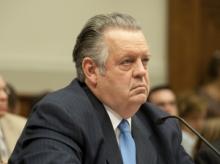
A top Southern Baptist official who was accused of plagiarism in a radio segment that claimed civil rights leaders and President Obama used the Trayvon Martin case to stir racial tensions will lose his weekly call-in program but can keep his main job, a church panel announced Friday.
Richard Land, the influential head of the Southern Baptist Convention's Ethics & Religious Liberty Commission and the denomination’s top policy spokesman, was rebuked for racial insensitivity and for not attributing the source of his radio commentaries after a review by ERLC trustees.
The controversy over Land’s explosive remarks in a March 31 radio program was especially awkward as Southern Baptists are expected to elect an African-American pastor, the Rev. Fred Luter, as the denomination's first black president later this month.
The investigators chided Land for “his hurtful, irresponsible, insensitive, and racially charged words” in a broadcast of the “Richard Land Live!” show in which Land accused Obama and black civil rights activists of using the Trayvon Martin shooting to foment racial strife and boost the president’s re-election chances.
Writing for The Washington Post, Lisa Miller says yes:
"Technology can greatly enhance religious practice. Groups that restrict and fear it participate in their own demise....If religious groups don’t embrace and encourage the practice of faith online, the faithful might go shopping instead."
Read more here
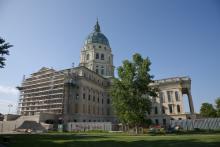
Recently, the Kansas’ legislature and governor enacted a law to ensure state courts and agencies do not consider foreign laws in legal decision-making. While the language is broadly written, the law’s narrow intention is clearly understood. The Kansas legislature has irrationally concluded that Sharia law somehow threatens the state’s well-being and decisive action was needed.
This, of course, is false.
IF THE FIRST decade of the 21st century began with the Supreme Court’s Bush vs. Gore ruling that selected a U.S. president, it ended with another decision that was also conspicuous as a departure from long democratic precedent. And like Bush vs. Gore, it was a case of judicial activism tilting the electoral system toward conservative interests and outcomes.
The Court’s 5 to 4 decision in Citizens United vs. Federal Election Commission on Jan. 21, 2010, allowed the use of corporate and union money in unlimited sums to influence election campaigns. Citizens United was, all at once, a truly remarkable piece of judicial activism, a precedent-shattering evisceration of a century-long tradition of limiting corporate power in American politics, a break with the republican tradition’s well-founded fear of political corruption, and a direct interference with the electoral rules in a way that favored those who had put the conservative justices in a position to make the ruling in the first place.
The case arose when Citizens United, a conservative group, brought suit arguing that it should be exempt from the restrictions of the 2002 McCain-Feingold campaign finance law for a movie it made that was sharply critical of Hillary Clinton, at the time a presidential candidate. The organization argued that, as a First Amendment matter, it should not be required by law to disclose who financed the film.
The conservative majority’s determination to go far beyond the specifics of the case it was considering became clear in June 2009 when the Court, in a remarkable act of overreach, postponed a decision and called for new briefs and a highly unusual new hearing. It chose to consider an issue only tangentially raised in the original case by calling into question a 1990 decision that upheld the long-standing ban on the use of corporate money in campaigns. As Justice John Paul Stevens noted later in his scalding dissent, “Essentially, five justices were unhappy with the limited nature of the case before us, so they changed the case to give themselves an opportunity to change the law.”

Social conservatives on Thursday reacted sharply to a federal appeals court ruling that declared the law barring federal recognition of same-sex marriage unconstitutional.
The First U.S. Circuit Court of Appeals judges are "intent on imposing their liberal, elitist views of marriage on the American people,” Brian Brown, president of the National Organization for Marriage.
In its unanimous ruling, the three-judge panel said the 1996 Defense of Marriage Act, or DOMA, deprives same-sex couples the same rights and privileges granted to heterosexual couples. The decision sets up a likely showdown in the Supreme Court and provides another culture war issue for the already contentious presidential campaign.
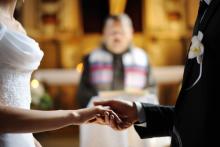
In the wake of President Obama's declaration of his personal support for the right of same-sex couples to marry under civil law, the nation is understandably focused on debating the merits of this position. Three related points from President Obama's announcement, however, deserve our attention as well.
First, President Obama noted that there is an important difference between civil marriage and religious marriage. The state defines civil marriage, which serves as the gateway for a wide variety of government benefits, rights and privileges. Religious marriage, on the other hand, is defined solely by religious communities.
These categories may be fuzzy in our minds because current law not only respects the ability of clergy and religious communities to define and bless religious marriage, it also allows clergy to solemnize civil marriage. That's why one often hears a minister conclude a wedding by saying, "By the authority vested in me by the state of X, I now pronounce you husband and wife."
Setting aside the oddity of a minister claiming the authority of the state rather than a higher power, the fact that the state allows clergy to bring a civil marriage into being does not mean it can require clergy to bless or recognize any relationship the state defines as civil marriage.
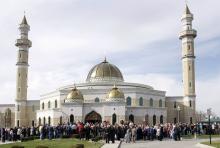
Mohammed Labadi had a lot at stake when the DeKalb City Council voted on May 29 on a request from the Islamic Society of Northern Illinois University to build a two-story mosque.
Labadi, a businessman and Islamic Society board member, said a bigger mosque is needed to replace the small house where local Muslims now worship. He also was hoping for affirmation that his neighbors and city officials have no fear of the Muslim community.
"Don't look at me just as a Muslim, look at me as an American," Labadi said. It's time, he says, "to take the unfortunate stereotypes about Muslims out of the picture." The City Council unanimously approved the plan.
In the decade since the 9/11 terrorist attacks, animosity toward Muslims sometimes has taken the form of opposition to construction of mosques and other Islamic facilities. National debate erupted over plans for an Islamic community center that became known as the "Ground Zero mosque" in Lower Manhattan.
As reported by Reuters today:
A federal appeals court on Thursday found a law that denies federal benefits to married same-sex couples unconstitutional, in a case with implications for gay marriages across the United States.
Read more about the ruling here
Christianity Today reports:
17 Coptic evangelical leaders met with five Muslim Brotherhood counterparts at the Brotherhood's headquarters on February 28, and crafted a joint statement of common values that both sides agree the new Egyptian constitution and government should uphold. Evangelicals comprise a minority of Egyptian Christians, almost 90 percent of whom are Coptic Orthodox.
Read more about this story here
A fascinating visual from the wonderful blog ‘I Love Charts’ caught some attention on the inter-webs yesterday, highlighting a little known fact from the statute books of some of the nation’s states:
There are seven states in the union which ban atheists from holding public office.
And by association, ban atheists from running for public office, unless a ‘Road To Damascus’ moment fortuitously occurs on the campaign trail.
The constitutions of Arkansas, Maryland, Mississippi, Pennsylvania, South Carolina, Tennessee and Texas all have provisions that require public office holders to adhere to a religious faith.
In Tennessee for example,
"No person who denies the being of God, or a future state of rewards and punishments, shall hold any office in the civil department of this state."
In Arkansas, atheism also appears to deny you the ability to testify in court:
"No person who denies the being of a God shall hold any office in the civil departments of this State, nor be competent to testify as a witness in any Court."
There’s probably an important lesson to learn from this revelation:
People looking to run for office should make sure they know their state’s constitution very well before they inadvertently break the law!
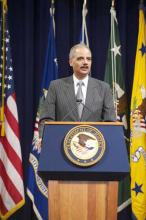
Attorney General Eric Holder and other legal experts strategized with black religious leaders May 30 about new restrictive state voting laws that could affect their congregants by reducing early voting and requiring identification.
“I would argue that of all the freedoms we have today, none is more important or more sacred than the right to vote,” Holder told about 200 people gathered for a meeting of the Conference of National Black Churches and the Congressional Black Caucus.
He acknowledged concerns about new voting laws and said his department has launched more than 100 investigations about racially discriminatory voting practices.

Mitt Romney clinched the GOP presidential nomination on May 28, becoming the first Mormon selected by a major political party. But will his barrier-breaking faith be a boon or bane to his White House campaign?
The answer to that question could presage the next president, and two studies published in May come to contradictory conclusions.
In both studies people were given information about Romney and his Church of Jesus Christ of Latter-day Saints, then asked whether they would be more or less likely to vote for him.
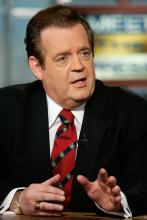
For the past 24 years, Richard Land has used his folksy charm and fiery rhetoric to become one of the leading voices of the religious right and the public face of the Southern Baptist Convention, the nation's largest Protestant group.
Now Land's future is in doubt amid an investigation over his remarks about the Trayvon Martin shooting and for alleged plagiarism.
A church committee is scheduled to issue its report by Friday (June 1), and there's a possibility that Land could lose his job as president of the Southern Baptists' Nashville-based Ethics & Religious Liberty Commission.
 In the Washington Post, Dana Milbank raises the question that has (apparently) been on everyone's lips during this election season:
In the Washington Post, Dana Milbank raises the question that has (apparently) been on everyone's lips during this election season:
Is Mitt Romney a unicorn?
An interesting question, we can all agree. By why are people asking?
According to Milbank:
The MittRomneyIsAUnicorn.com campaign came about because Arizona Secretary of State Ken Bennett, citing allegations that the birth certificate President Obama released is a fraud, threatened to take the incumbent off the ballot.
Another Post, writer, Alexandra Petri noted that, as many 18,000 people have signed on to a petition "demanding proof that Mitt Romney was not a unicorn", in light of the fact that "unicorns, as the petition pointed out, are ineligible for the presidency of the United States".
We will let you make up your own minds on this one folks...
P.S. Take a few seconds to check out the fantastic artwork that Petri employed to bring some clarity to the Mitt Romney/Unicorn claims. They are, in her own words "some of my best MS Paint work yet."
CNN reports:
The long-running battle between a Tennessee Muslim community and its critics over a new mosque took a dramatic turn when a judge ruled that construction had to halt.
The Islamic Center of Murfreesboro has existed for more than a decade, but the fight erupted in May 2010, when planning commissioners approved the center's plans to build a 52,960-square-foot building for a new mosque on Veals Road.
For Christianity Today, Jayson Casper writes: